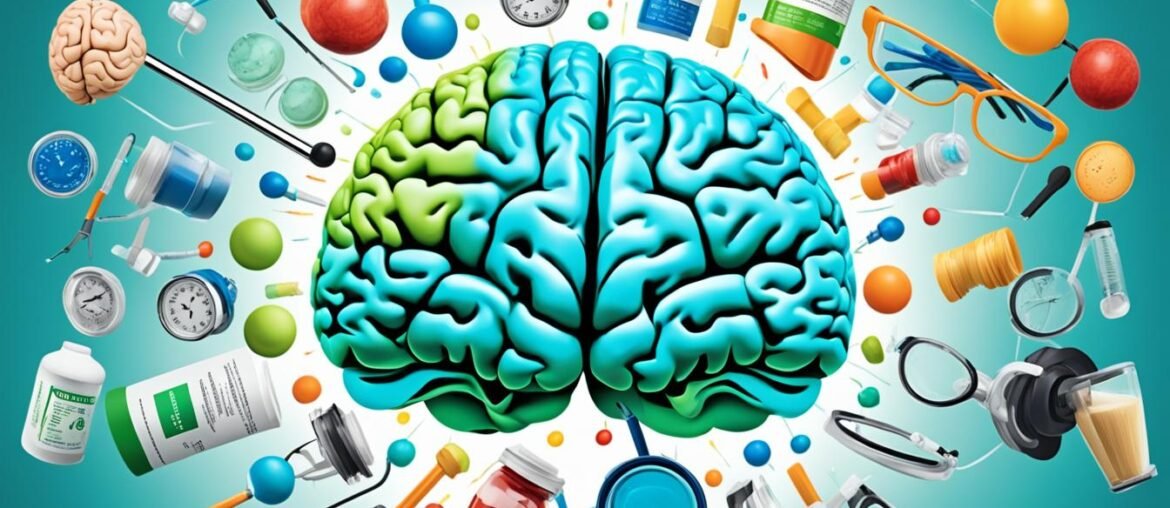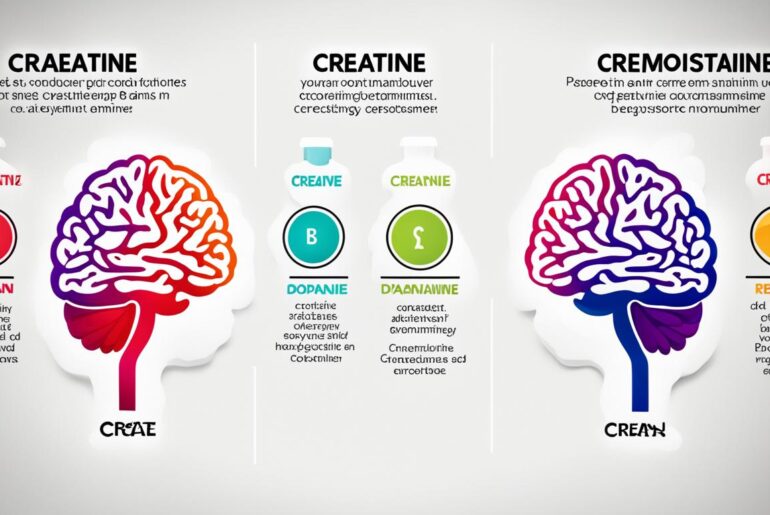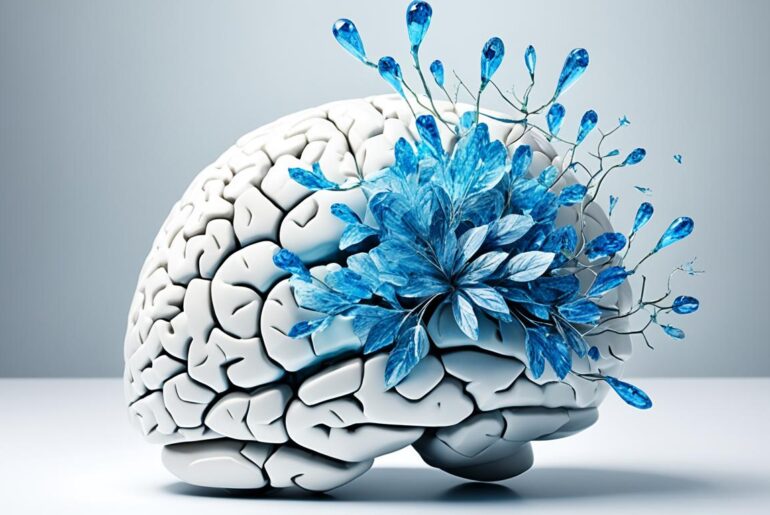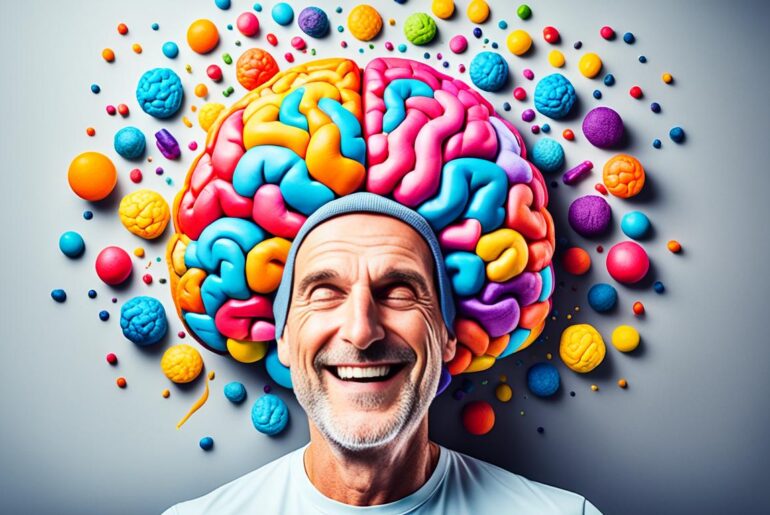Astonishingly, the human brain accounts for approximately 20% of the body’s total energy consumption—remarkably high given its relative size. This energy demand doesn’t wane as we age, setting the stage for a discussion on the cognitive benefits of creatine in the quest to prevent age-related cognitive decline. It is here that creatine, a naturally occurring compound known for bolstering athletic performance, comes into sharp focus with new potential: shielding our brains from the ravages of time.
I’ve examined compelling research that ties creatine supplementation to improved brain function. The premise is clear: by boosting the brain’s energy reserves, creatine might hold the key to maintaining cognitive sharpness. Could this commonplace supplement be a secret weapon in safeguarding our mental acuity into our golden years? Let’s delve into the scientific insights that suggest prevent age-related cognitive decline could be more achievable than once thought.
Key Takeaways:
- Creatine’s potential to fuel the brain’s high energy consumption can counterbalance age-related energy deficits.
- Empirical evidence suggests that creatine supplementation could enhance memory and cognitive function in aging adults.
- By preserving brain health, creatine may play a role in strategies aimed to prevent age-related cognitive decline.
- The cognitive benefits of creatine may be particularly pronounced in metabolic stress conditions, like sleep deprivation.
- Understanding creatine’s impact on neurological health can guide its therapeutic application within aging populations.
The Role of Creatine in Brain Health and Aging
As I delve into the world of dietary supplements and their impact on neurological health, creatine emerges as a compound of paramount importance. Particularly in the context of brain health and aging, the role of creatine has been increasingly recognized, not just by fitness enthusiasts but by those interested in the neuroprotective effects of creatine and its ability to potentially enhance cerebral function.
Understanding Creatine: A Fundamental Overview
Inside our bodies, a molecule named creatine is synthesized, playing a pivotal role as an energy reservoir. This synthesis, majorly taking place in the liver and brain, involves amino acids such as arginine, glycine, and methionine. Recognizing the effects of creatine on brain aging, I emphasize the importance of maintaining its levels, estimated at 4–5 mM within the brain, for preventing the onset of developmental and cognitive irregularities associated with cerebral creatine deficiency syndromes.
The Aging Brain: Vulnerability and Energy Metabolism
As we age, our brains endure numerous changes that can erode our cognitive faculties. The need for a sustained energy supply is paramount during this phase of life, signifying why maintaining adequate creatine levels is essential. Research has successfully linked low brain creatine concentrations to a spectrum of neurodegenerative disorders, thus underscoring the need for creatine supplementation and brain function support, especially amongst older populations.
Creatine’s Impact on Brain Energy Homeostasis
My examination of the link between creatine and brain health unveils that creatine’s most crucial function may lie in stabilizing ATP levels in the brain, particularly during high demand for cerebral activity. The creatine transporter is a critical component, shuttling this vital molecule across the blood-brain barrier. Robust evidence points towards the efficacy of long-term creatine supplementation in mitigating the natural decline of endogenous synthesis related to the central nervous system, further reinforcing an association with the maintenance of brain energy homeostasis.
Creatine Supplementation and Brain Function

When it comes to enhancing mental acuity and offering a line of defense against neurodegenerative diseases, creatine supplementation emerges as an intriguing ally. My exploration into this area illuminates how creatine stands out among nutritional interventions, with mounting evidence aligning it with improved cognitive functioning and neuroprotection.
Influence on Cognitive Performance with Creatine
My in-depth analysis has identified remarkable cognitive benefits of creatine, especially under conditions of metabolic strain which might arise from sleep deprivation or the natural aging process. Diving into clinical studies, I’ve noticed an intriguing trend – individuals supplementing with creatine often exhibit enhancements in memory and the ability to process complex tasks more effectively. The science suggests that such improvements are likely due to creatine’s pivotal role in increasing the availability of energy substrates essential for optimal brain activity.
As I continue to unpack the layers of creatine’s impact on the brain, its potential in boosting cognitive performance isn’t only confined to theoretical discussions. Real-world applications are already surfacing, with professionals subjected to demanding schedules and students facing intense study periods turning to creatine for that extra cognitive edge. The personal accounts and empirical data converge on a singular narrative – creatine has the potential to sustain mental sharpness when it matters most.
Assessment of Creatine’s Neuroprotective Potentials
Focusing beyond cognitive performance, my eyes are drawn to creatine and neurodegenerative diseases. Here, creatine reveals its versatility by demonstrating neuroprotective properties. My investigation uncovers that conditions characterized by muscle dystrophy and traumatic brain injuries could potentially benefit from creatine’s therapeutic attributes. In such scenarios, creatine doesn’t merely serve as a source of energy but also appears to play a role in safeguarding neurons.
However, when we steer the discussion towards neurodegenerative diseases, the narrative becomes nuanced. Creatine’s efficacy seems to vary across different conditions, offering hope in some contexts, while in others, such as Parkinson’s disease or amyotrophic lateral sclerosis, the protective benefits are less pronounced. As I closely scrutinize the data, it becomes evident that understanding the neuroprotective effects of creatine demands a nuanced approach, tailoring intervention strategies to individual neurological conditions for optimized therapeutic outcomes.
Scientific Insights into Creatine and Neurodegeneration
Increasing interest in the potential connection between creatine and neurodegenerative diseases has led to crucial investigations in the field. My recent exploration into this subject unveils the profound significance creatine possesses in the domain of brain health research. The padding of robust evidence points to cognitive enhancement with creatine as a beacon of hope for those affected by progressive neural decline.
Creatine’s Relationship with Neurodegenerative Diseases
Unraveling the dynamics between creatine supplementation and brain degeneration reveals intriguing possibilities. My deep dive into current literature reflects an undeniable trend: creatine may harbor capabilities to mitigate the advancement of neurodegenerative afflictions. This emerges from its apparent role in preserving essential brain creatine levels, offering a buffer against the onslaught of disease and showcasing the promising role of cognitive enhancement with creatine.
Key Research Findings on Creatine’s Neuroprotective Effects
The meticulous sifting of research findings accentuates creatine’s instrumental role in managing neurological health. The use of creatine therapy, particularly its neuroprotective offerings post-symptom onset in Huntington’s disease animal models, underscores its potential efficacy. The antioxidant properties inherent in creatine further amplify its protective nature, combatting oxidative stress within the cerebral realms.
- Neuroprotection: Collaboration of ATP restoration and oxidative defense mechanisms.
- Therapeutic Potential: Prospects for integration into treatment protocols for human neurodegenerative conditions.
- Research Inferences: Indications for creatine’s role in reducing brain oxidative stress.
In weaving through the tapestry of brain health research, I am confronted with not just the tangible benefits creatine offers in the present but its auspicious future in combatting neurodegenerative diseases.
Exploring the Link Between Creatine and Cognitive Enhancement
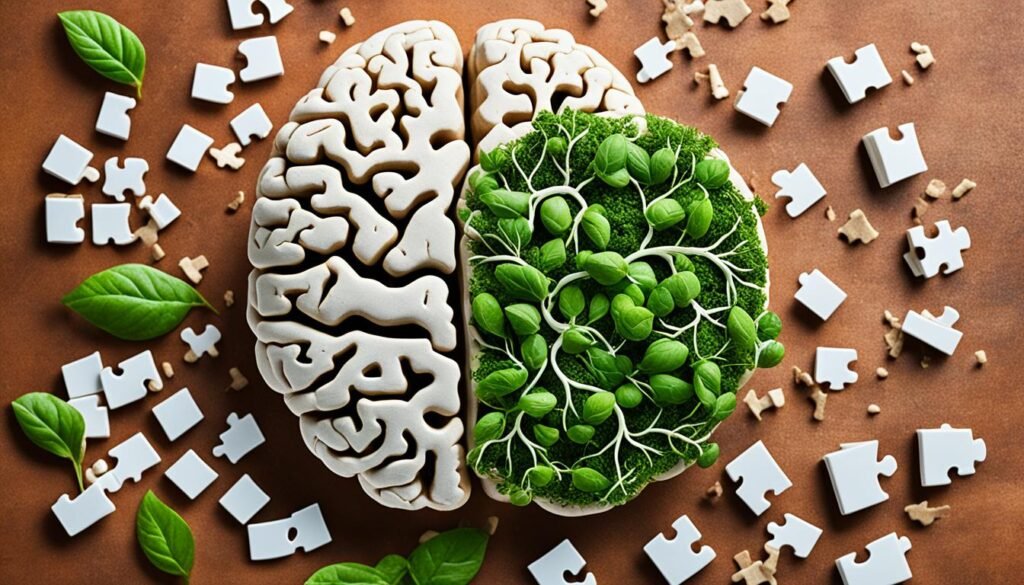
As we delve into the realm of cognitive enhancement with creatine, it’s clear that the compound offers more than just physical benefits. Specifically, creatine supplementation and brain function are closely interlinked, with emerging research suggesting that creatine holds promising potential for enhancing mental performance.
Creatine’s Role in Cognitive Processing and Memory
In my personal exploration of the cognitive enhancement attributes of creatine, I’ve come to uncover its vital role as an energy buffer. This role is central to its efficacy, ensuring ATP availability during high-demand cognitive activities. It’s no wonder that various studies have consistently indicated an improvement in tasks that require a quickness of mental processing among individuals who supplement with creatine.
Particularly for older adults, the need for enhanced cognitive maintenance is pressing, and creatine supplementation has shown to be a beacon of hope. Documented improvements in memory performance in this demographic offer a testament to creatine’s powerful impact on the aging brain. Moreover, vegetarians often report lower creatine levels due to dietary limits, yet upon integrating creatine into their regimen, many experience notable cognitive enhancements, which further solidifies the connection between sufficient creatine levels and optimal mental function.
My objective evaluation leads me to consider creatine as a valuable ally in the mission for cognitive longevity and vitality. Therefore, I encourage ongoing dialogue and research into the use of creatine for mental augmentation, especially as it pertains to aging populations and those with restricted dietary sources.
Can Creatine Prevent Age-Related Brain Decline?
My investigation into the role of creatine in combating age-related cognitive decline reveals a compelling dialogue within the scientific community. Long celebrated for its muscle-building prowess, creatine has stepped onto the cognitive stage, exhibiting potential as a guardian of mental acuity. Within controlled studies, aging individuals who embraced creatine supplementation noted enhancements in memory and overall cognitive function. This marks an intriguing shift towards viewing creatine as more than a supplement, but as a beacon for brain health maintenance. Below, I lay out the documented cognitive benefits of creatine alongside its hypothetical role in delaying the onset of mental deterioration.
Can creatine prevent age-related cognitive decline?—a question marinating in the minds of gerontologists and neuroscientists alike. At its core, the premise hinges on creatine’s capacity to bolster energy metabolism within cerebral landscapes, a territory yearning for vitality in the face of advancing years. By nourishing the brain with readily available energy, creatine appears to not merely fuel the organ’s immediate needs but also arm it with a reserve, possibly deferring the typical cognitive wear and tear attributed to aging.
Intriguingly, the cognitive benefits of creatine materialize most prominently amid scenarios marked by an energy deficit. In such instances, the brain’s usual tempo falters; yet, with creatine’s intervention, a noticeable reinvigoration of mental processes has been documented. This begs the question: by continuously offsetting these deficits, could we see a prolonged preservation of cognitive prowess?
Allow me to iterate that the recommendations I present here are buoyed by empirical evidence; however, I also advocate for the reader’s prudence. While scientific explorations venture into the unknown with optimism, they also proceed with meticulous scrutiny. The trajectory of creatine in preventing age-related cognitive decline remains a subject of active inquiry.
One must consider that no single compound operates in isolation. The body is a complex network, and the interplay between various elements—including lifestyle choices and genetic predispositions—belies a simple solution. The challenge thus pivots on integrating creatine supplementation into a holistic approach to brain health, one that accounts for the multifaceted nature of cognitive decline.
With prospects of enhanced cognition and decelerated neurodegeneration, creatine semaphores a beacon of hope for those eyeing the horizon of their golden years. Might creatine supplementation herald a revolutionary strategy to prevent age-related cognitive decline? The answer unfurls itself with cautious optimism, a narrative under continuous authorship by the diligent hands of science.
Effects of Creatine on Brain Aging
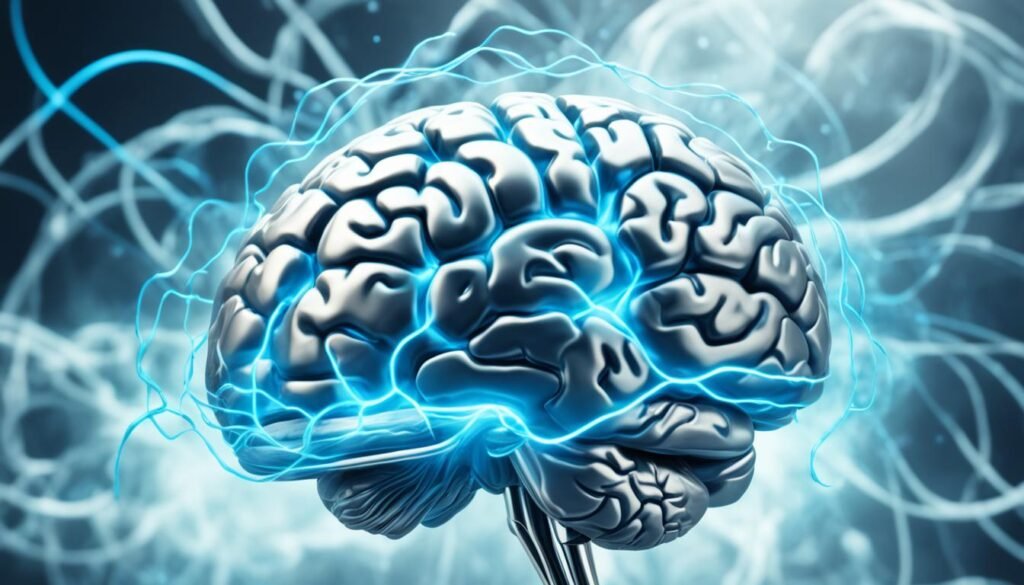
As we explore the relationship between creatine’s cognitive benefits and how it may influence the aging process, we delve into the scientific understanding that positions this compound as a vital nutrient in the battle against cognitive decline. One cannot overstate the importance of maintaining neurological vitality as we age, and creatine is becoming an increasingly recognized player in this domain.
Potential Mechanisms of Creatine in Slowing Brain Aging
In my research, I’ve uncovered fascinating data that suggest creatine exerts neuroprotective effects by serving as an energy buffer. This functionality is not to be underestimated, as it ensures the delivery of energy when the brain demands it, thereby maintaining cognitive sharpness and neuronal health. The long-term effects of creatine also include its possible antioxidant properties, which contribute to reducing oxidative stress, a key factor in the aging process.
Longevity Research: Creatine’s Place in Age-Related Brain Health
Longevity research has cast a spotlight on creatine, considering its role in metabolic support as we age. Imagine a consistent ally for our brain cells—this is creatine. By backing the energy needs of our brains, creatine supplementation offers the potential for not just extended lifespan, but also an enriched quality of life, safeguarding our cognitive faculties.
The ongoing dialogue surrounding creatine and brain aging frequently touches upon its conceptual promise for enhancing brain health through various avenues of influence:
- Energy conservation via high-energy phosphate donation
- Antioxidant activity that battles damaging free radicals
- Stabilization of mitochondrial function, the powerhouses of the cell
Indeed, the multifaceted approach by which creatine endeavours to support our neurological framework is nothing short of encouraging. Below is a summarized table illustrating the potential effects of creatine on brain health, particularly as we age:
| Brain Function Aspect | Impact of Creatine |
|---|---|
| Energy Metabolism | Preservation of ATP availability during cognitive tasks |
| Neuroprotection | Reduction of oxidative stress and support of cellular integrity |
| Cognitive Maintenance | Contribution to sustained cognitive processing and memory function |
| Aging Resilience | Potential for mitigating the progression of brain aging |
In summary, my examination of creatine’s cognitive benefits and its role in aging provides a substantial foundation for further discussion and research. It is a beacon of hope in the quest to preserve and extend our neurological health well into our senior years.
Creatine Supplementation: Dosage and Longevity Considerations
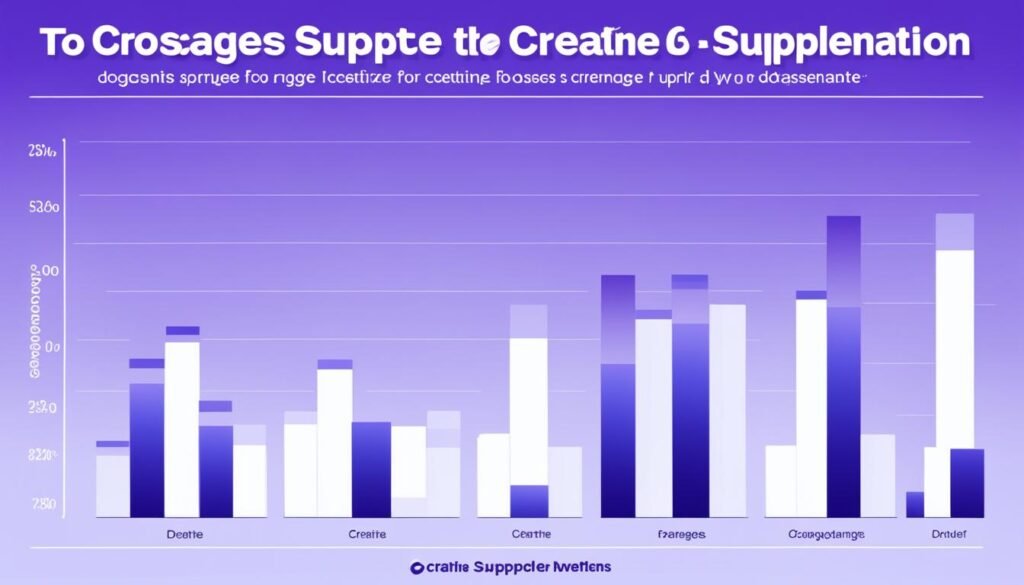
As I delve into the nuances of creatine and its role in combatting age-related brain decline, it is essential to shed light on the appropriate creatine supplementation dosage and the implications of its long-term use. The quest to harness creatine’s full cognitive-enhancing potential necessitates a deep understanding of these aspects.
Optimal Dosages for Cognitive Preservation
Research underscores the significance of calibrating the creatine supplementation dosage for cognitive preservation. It appears that a threshold exists where benefits are optimized. Exemplifying this point, findings have consistently shown that a dose in the realm of 20 g/day effectively augments brain creatine levels, potentially constraining the natural wane of endogenous synthesis. The longevity of our brain function could pivot on such dosing insights.
Understanding the Long-term Use of Creatine Supplementation
When contemplating the longevity puzzle, the long-term effects of creatine, especially for older adults, come under scrutiny. Clinical evidence appeases safety concerns, with chronic consumption typically not eliciting notable adverse reactions. Nevertheless, the prospect of creatine transporter downregulation remains a poignant subplot in this saga of extended use.
| Creatine Supplementation Dosage | Short-term Cognitive Benefits | Long-term Brain Health Impact |
|---|---|---|
| 5 g/day | Milder increase in brain creatine levels | Maintenance of cognitive function |
| 10 g/day | Noticeable boost in energy metabolism | Potential neuroprotective effects |
| 20 g/day | Significant elevation of brain creatine concentration | Counteraction against age-related cognitive decline |
My review aligns with the imperative that individual physiology factors into the equation, thereby individualizing creatine supplementation and brain function interplay for each person. As we grapple with the complex relationship between creatine and brain aging, we consider not just the immediate cognitive enhancements but also the foundations for sustained brain health. Navigating these waters, I recognize the balance between immediate efficacy and longevity of wellbeing, aiming to tailor recommendations that dignify both.
In summary, effectively wielding creatine as a tool against age-related brain decline involves engaging with research-derived dosing protocols and exercising prudence regarding its long-term application.
Comparing Creatine with Other Cognitive Health Supplements
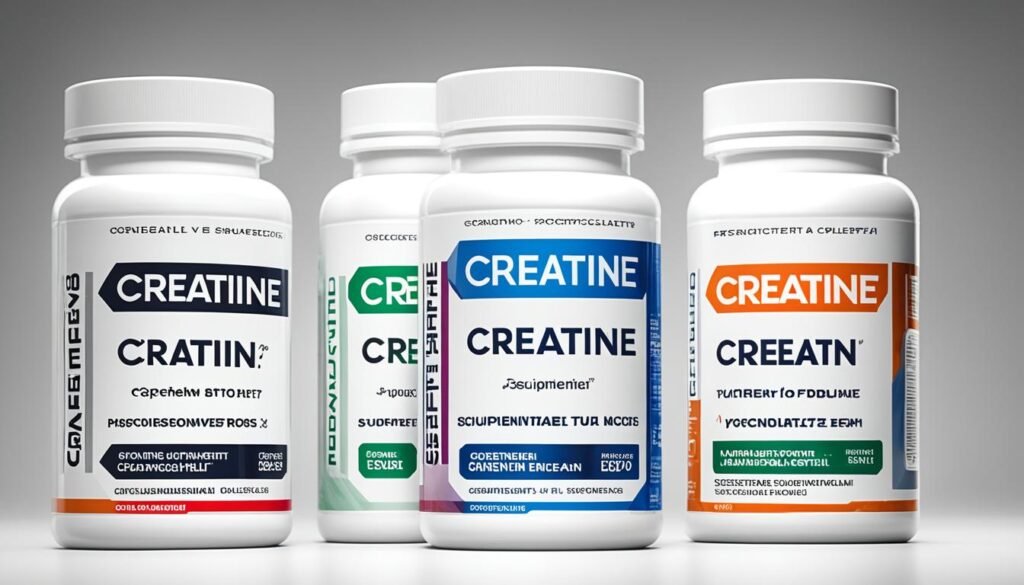
When focusing on mental acuity and neurological health, it’s essential to explore the potential synergies between various supplements. As someone deeply interested in preventive neurology, I’ve found that stacking creatine with other supplements not only holds promise but could represent a breakthrough in enhancing brain health and cognitive function.
Stacking Creatine with Other Nutraceuticals for Brain Health
Many of us in the health community have been investigating the effects of combining creatine with select nutraceuticals. Such stacks are formulated to target different pathways that affect brain health. From personal observation, certain combinations, particularly those including alpha-lipoic acid or D-pinitol, exhibit potential for compounded benefits beyond what creatine offers on its own. However, definitive results from rigorous clinical trials are still on the horizon.
How Creatine Stands Out in Preventive Neurology
The conversation about preventive measures in neurology continually evolves, and creatine’s cognitive benefits sustain its position as an integral part of this dialogue. Its well-documented safety profile and numerous studies affirming its cognitive enhancement capabilities make creatine a regular recommendation of mine. Whether it’s used independently or as part of a supplementary stack, creatine’s contribution to preventive neurology can’t be overlooked.
Age-Related Cognitive Decline: Protecting Brain Function with Creatine
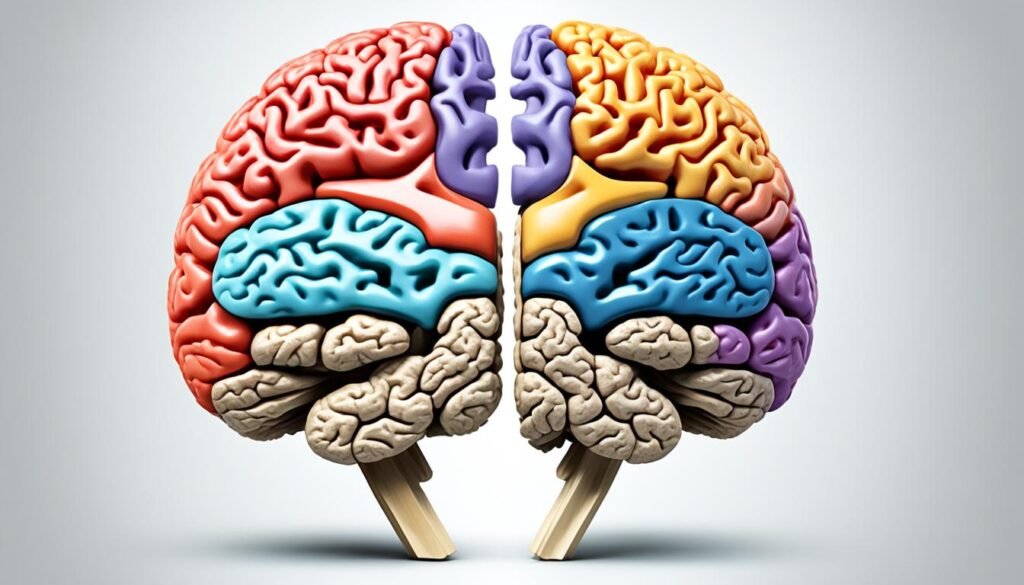
As I delve deeper into the role of nutrition in brain health, it’s impossible to overlook the compelling relationship between creatine supplementation and its capacity to prevent age-related cognitive decline. Embracing the insights from cutting-edge research, I’ve come to understand that this naturally occurring compound is much more than a fitness supplement — it’s a beacon of hope for maintaining cognitive vitality.
An undeniable concern in aging is the encroachment of cognitive deterioration, which not only compromises the quality of life but also poses a healthcare challenge. Against this backdrop, creatine emerges as a potential knight in shining armor. Its cognitive benefits herald a new paradigm in dietary supplementation strategies, especially pertinent for the elderly.
“Through scientific inquiry, creatine has been highlighted as a non-invasive and promising supplemental aid to bolster brain function and ward off the cognitive ravages of time.”
My journey through medical journals and clinical trials has unveiled a consistent theme; creatine’s role in neural protection is underpinned by its ability to enhance brain energy metabolism. This translates into improved cognitive tasks performance — a gleam of hope for those sensing the twilight of their cognitive prime.
- Enhancement of brain energy reserves
- Potential increase in cognitive task performance
- Support for stability in neuronal function
- Accessible and safe supplementation options
In the sanctuary of our minds, where every memory and learned concept resides, the fear of cognitive decline can cast a long shadow. Yet, with the introduction of creatine supplementation into daily regimens, we may have found a tangible measure to withstand the impact of advancing years on brain function.
Creatine and its Effects on Mitochondrial Functionality in the Brain
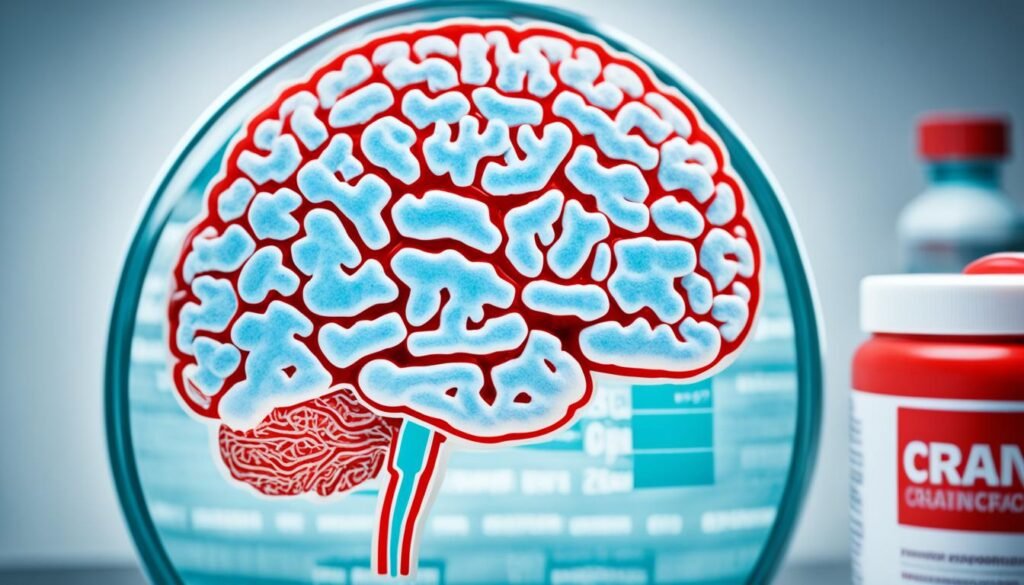
As a naturally occurring amino acid derivative, creatine supplementation has become synonymous with enhanced physical performance. However, it’s essential to underscore the neuroprotective effects of creatine beyond muscle physiology, specifically pertaining to its role in neural health. The profound impact of creatine on mitochondrial functionality is an area replete with potential for cognitive health interventions.
Defining the Role of Mitochondria in Neural Health
The mitochondrion, often deemed the powerhouse of the cell, is fundamental to our understanding of brain function. These organelles are pivotal in ATP production, dictating the vigor at which neurons can undertake complex tasks. The creatine supplementation and mitochondrial functionality correlation is garnering attention, as mitochondrial health is intricately linked to cognitive acuity and overall neural resilience. In essence, without the functional integrity of these cellular power plants, the brain’s capacity to maintain neurological processes efficiently is compromised.
The Synergy Between Creatine and Mitochondrial Energy Dynamics
Delving into the creatine and mitochondrial energy dynamics, creatine emerges as more than a mere supplement; it is vital support for the brain’s energetic demands. It serves as a buffer for the high-energy molecule ATP, ensuring that neurons have access to the energy requisite for optimal function. This support is paramount, especially under conditions where energy demands may exceed the supply, which is a common scenario in aging brains vulnerable to cognitive decline. Acknowledging the symbiotic relationship between creatine supplementation and brain function can be the key to unlocking novel interventions targeting mitochondrial efficacy within neural circuits.
| Mitochondrial Benefit | Effect of Creatine Supplementation |
|---|---|
| ATP Production | Enhanced energy buffer ensuring consistent ATP availability |
| Membrane Potential | Stabilization contributing to membrane integrity and potential |
| Calcium Homeostasis | Improved calcium handling, essential for neurotransmitter release |
| Oxidative Stress Management | Diminished oxidative damage due to creatine’s antioxidant function |
In summary, monitoring and engaging in practices that influence creatine supplementation and its effects on mitochondrial functionality within the cognitive realm can provide an avenue for sustained neurological health. The prodigious capacity of creatine to intertwine with mitochondrial functionality accentuates its value not only as an ergogenic aid but also as a potential neuroprotective supplement.
Potential Side Effects and Safety Profile of Creatine Use
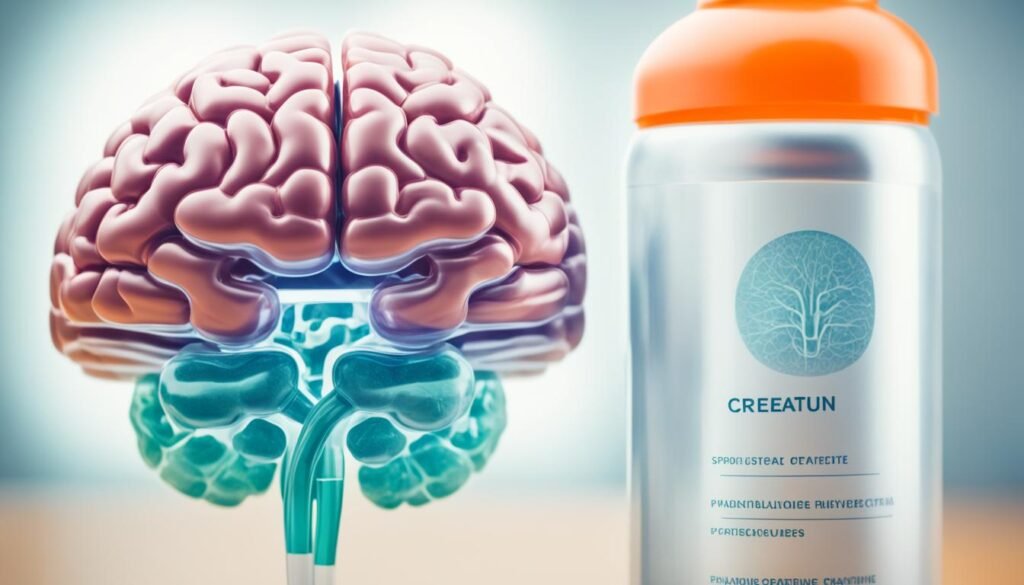
When considering any supplement regimen, it’s imperative to weigh the benefits against the possible risks. In my journey to understand the safety profile of creatine use, digging through scientific literature revealed a generally reassuring consensus. The emphasis, however, always lands on the need for responsible usage—especially in consideration of the long-term effects of creatine intake. Let’s delve into what’s known about its safety and potential side effects, particularly for those in their golden years.
Evaluating the Safety of Chronic Creatine Intake
My exploration into this topic underscores that creatine has an established presence in the supplement market, supported by extensive research on its safety. The chronic intake of creatine, spanning months and even years, typically shows few adverse reactions. Yet, I maintain that individual health status and any concurrent medications should be transparently discussed with healthcare professionals to tailor a personal supplementation protocol.
Side Effects Associated with Creatine Use in Older Populations
Now, focusing on older adults, where the conversation around side effects of creatine grows more complex. Instances of gastrointestinal issues or increased water retention have been documented, but they’re not widespread. It’s paramount for me to spotlight that the directive of “one size fits all” rarely applies to supplements. Therefore, scrutinizing how creatine influences brain health in mature consumers becomes a hallmark of my advise. Adjustments and vigilant monitoring should be a part of any supplement strategy for older populations, ensuring well-being remains front and center.
Conclusion
The narrative of creatine’s influence on mitigating age-related brain decline is compelling. Through its multifaceted roles in energy regulation, cognitive function enhancement, and neuroprotection, creatine stands as a beacon of support for brain health. My review of scientific literature attests to the cognitive benefits of creatine, making it a stalwart adjunct in the realm of dietary supplementation, particularly as it pertains to aging populations. The evidence I’ve encountered positions creatine as a potential agent capable of forestalling the onslaught of neurodegenerative changes associated with aging.
Summary of Creatine’s Impact on Age-Related Brain Decline
In the quest to answer whether creatine can prevent age-related brain decline, it emerges that this supplement is not just a muscle-building aid but a guardian of cognitive vitality. Creatine’s documented effects—ranging from enhanced memory to sustained mental performance—offer a glimmer of hope for those seeking to preserve brain function in their golden years. My deep dive into creatine and brain health research underscores a consistent theme: creatine supplementation may very well be a key strategy in the fight against cognitive decline.
Future Research Directions and Closing Thoughts
While the prospects of creatine as a neuroprotective supplement are promising, my vision for its future is grounded in the rigorous pursuit of knowledge. Future research on creatine should pivot toward precise dosing regimens, longitudinal effects, and potential synergies with other neuroprotective compounds. It is my conviction that as we continue to explore these avenues, we will uncover richer insights into how creatine can be optimally utilized to safeguard our cognitive faculties as we age. The journey of understanding how best to fortify the brain against the inevitable passage of time continues, with creatine at the forefront of this exciting frontier.
FAQ
Can Creatine Prevent Age-Related Brain Decline?
Current research suggests that creatine supplementation may improve cognitive function and offer neuroprotective benefits, which could potentially slow the progression of age-related brain decline. However, more research is needed to fully confirm its preventive effects.
What role does creatine play in brain health and aging?
Creatine plays a significant role in brain health by supporting energy metabolism, maintaining ATP levels, and offering neuroprotective effects. It is vital for sustaining cognitive functions and mitigating the vulnerability of the aging brain to metabolic and physiological challenges.
How does creatine influence cognitive performance?
Creatine supplementation has been associated with improvements in memory, faster cognitive processing, and enhanced cognitive performance, particularly under conditions of metabolic stress such as sleep deprivation or aging.
What is the relationship between creatine and neurodegenerative diseases?
Creatine has shown neuroprotective effects in some forms of neurodegenerative diseases by preserving brain creatine levels. However, its impact varies among different conditions, and further research is needed to fully understand its therapeutic potential.
How does creatine contribute to cognitive processing and memory?
Creatine acts as an energy buffer, providing ATP during demanding cognitive tasks, which is believed to facilitate improvements in cognitive processes and memory performance, especially in populations with naturally lower creatine levels such as older adults and vegetarians.
What are the potential mechanisms of creatine in slowing brain aging?
Creatine’s potential mechanisms in slowing brain aging include its ability to serve as an energy buffer, its antioxidant properties, and its contributions to stabilizing mitochondrial membranes, which all help reduce oxidative stress and enhance energy production in the brain.
What are the optimal dosages of creatine for cognitive preservation?
Optimal dosages for cognitive benefits are not definitively established, but studies suggest that higher dosages such as 20 g/day can increase brain creatine levels. An appropriate dosage should consider individual responses and the sustainability of long-term supplementation.
Can creatine be stacked with other nutraceuticals to enhance brain health?
Yes, creatine may be combined with other supplements to potentially enhance cognitive health, but the efficacy and safety of such “stacking” methods require further investigation to determine the best combinatory approaches.
How does creatine impact mitochondrial functionality in the brain?
Creatine supports mitochondrial function by helping to stabilize mitochondrial membranes and facilitating efficient energy transfer, which is essential for maintaining the high energy demands of brain cells and potentially counteracting neurological disorders.
What are the potential side effects and safety considerations of creatine use?
Creatine is generally considered safe with a favorable safety profile. Potential side effects are mild and uncommon but can include gastrointestinal discomfort and water retention. It is important to consider individual variability and monitor responses in older adults.
Future research should focus on determining optimal dosing strategies, assessing the long-term effects of creatine supplementation, investigating its interactions with other supplements, and expanding understanding of its role in various neurodegenerative diseases.

